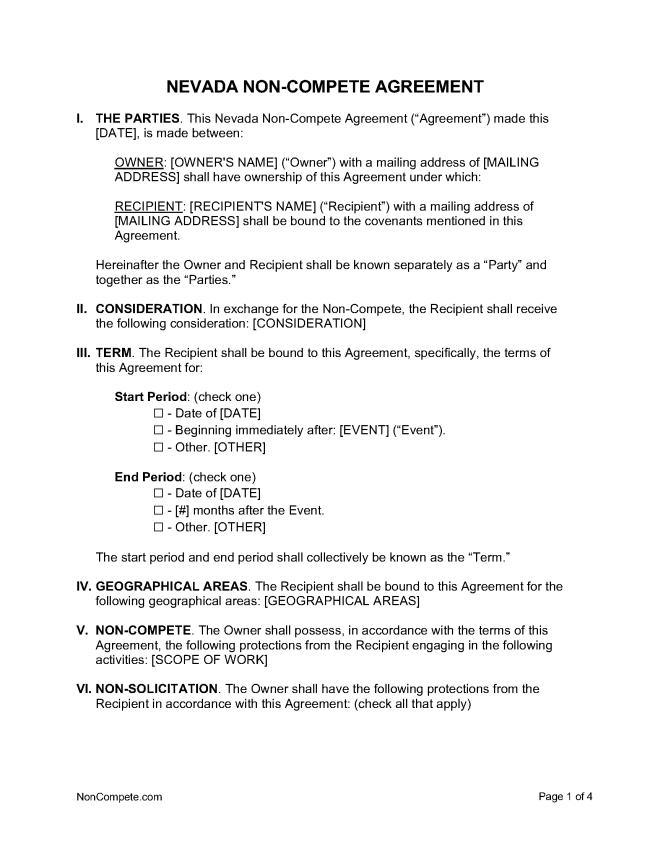A Nevada non-compete agreement is a contractual restraint that prevents someone from working in or running a business in a particular line of work. Nevada permits non-compete agreements, but takes a relatively strict stance.
Unlike most states, Nevada also does not automatically permit the buyer of a company to enforce a non-compete agreement against an employee who signed it with the previous owner. Agreements in the state must be carefully written or risk being thrown out.
Table of Contents |
Are Non-Competes Enforceable in Nevada?
Yes, non-competes are enforceable if they:
- Are part of a valid contract;
- Are no greater than necessary to protect the interest of the employer;
- Do not impose a hardship on the covered employee;
- Impose restrictions that are reasonable given the costs and benefits to the parties in the agreement.
Nev. Rev. Stat. Ann. § 613.195
Non-competes must be reasonably necessary to protect the business and good will of an employer, and no more extensive than necessary to protect those interests. (Shores v. Glob. Experience Specialists, Inc. (2018)).
Reasonableness
Reasonableness depends on:
- The amount of time the non-compete agreement lasts;
- The size of the territory it covers; and
- The hardship imposed on the restrained party.
Legitimate Business Interest
Non-competes are typically prohibited by law, but Nev. Rev. Stat. Ann. § 613.200 permits reasonable agreements that protect the following business interests:
- Trade secrets
- Business methods
- Lists of customers
- Secret formulas or processes
- Confidential information learned or obtained during the course of employment
Sale of Business vs. Employment Contract
Non-compete agreements associated with employment contracts are scrutinized more thoroughly than non-competes arising out of the sale of a business. (Ellis v. McDaniel (1979)).
Territory Covered
Non-compete agreements cannot cover an area broader than the areas where the employer has established customer contacts or relationships and built up good will. (Camco, Inc. v. Baker (1997)).
Assignability
Non-compete agreements are not “assignable,” meaning if an employee signs a non-compete agreement with Company A, and Company B buys company A, the employee does not automatically have a non-compete agreement with Company B.
In order for the agreement to be assignable, it must explicitly state that assignment is permitted, and there must consideration offered for this point separate from the rest of the agreement. (Traffic Control Servs., Inc. v. United Rentals Nw., Inc. (2004)).
Prohibited Professions
Attorneys may not enter non-compete agreements contained in employment contracts, partnership agreements, or similar documents. Rule 5.6(a), Nevada Rules of Professional Conduct.
Terminating an Employee
Non-compete agreements are enforceable if an employee is terminated, but if the employee is laid off or let go because of a company’s restructuring or reorganization, then the non-compete is effective only for the amount of time that the company continues to pay the employee’s salary. Nev. Rev. Stat. Ann. § 613.195
Burden of Proof
The party seeking to enforce the non-compete agreement has the burden of proving that it is reasonable. (Shores v. Glob. Experience Specialists, Inc. (2018)).
Continued Employment (consideration)
For someone already working in an at-will position, an offer of continued employment is sufficient consideration to enforce a non-compete agreement. (Camco, Inc. v. Baker (1997)).
Maximum Term
There is no clear rule about the maximum term for a non-compete agreement in Nevada. Courts consider the circumstances of each case uniquely.
In Ellis v. McDaniel (1979), the Nevada Supreme Court upheld a two-year restriction covering a five-mile radius was reasonable, but declined to enforce the agreement because restraining the employee, a doctor, would have limited the availability of orthopedic specialty surgeons.
In Jones v. Deeter (1996), the Nevada Supreme Court held that a restriction lasting five years and covering a 100-mile radius was not reasonably necessary for the protection of the employer’s business.
Blue Penciling
If a portion of a non-compete agreement is unreasonable, then the whole agreement is unenforceable. (Golden Rd. Motor Inn, Inc. v. Islam (2016)).
